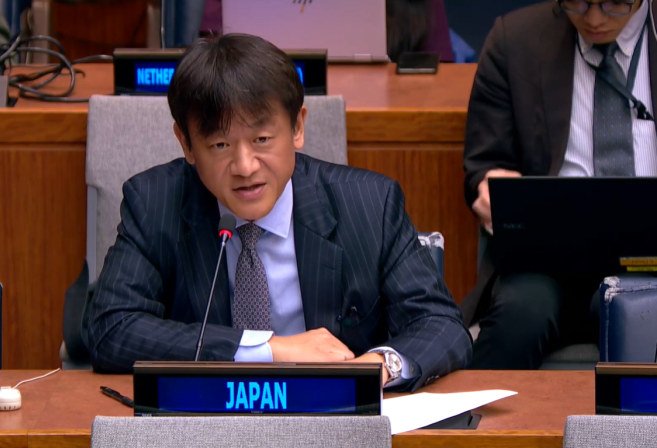第80回国連総会第4委員会議題48「宇宙空間の平和利用」に関する入谷公使ステートメント
令和7年10月30日

(As delivered)
Mr. Chair,
Japan reiterates its strong commitment to international cooperation on the peaceful uses of outer space in accordance with international law. We will continue to contribute at multilateral fora and leverage our experience and technology for the benefit of all.
Japan welcomes the achievements of the Committee on the Peaceful Uses of Outer Space (COPUOS) and the ongoing discussions there on ensuring the safety, security, sustainability, and stability of outer space. Japan also recognizes the importance of the UN Office for Outer Space Affairs (UNOOSA) as an institution uniquely situated to enhance international cooperation and capacity-building in this field.
Japan would like to stress four elements, namely the importance of compliance with the Outer Space Treaty, Japan’s efforts for sustainability, space cooperation with international partners, and capacity-building to enhance the rule of law in outer space.
First, considering the growing number of space actors, each country needs to conduct its space activities in a responsible manner, in accordance with the existing normative framework as well as international law. Japan reiterates the importance of the obligations of all States Parties to comply with the Outer Space Treaty, including not to place in orbit around the Earth any objects carrying nuclear weapons or any other kinds of weapons of mass destruction. Outer space must remain a domain free from nuclear weapons.
Second, Japan is firmly committed to addressing issues of space debris through our domestic law and guidelines. This commitment was clearly demonstrated by then Japanese Minister for Space Policy Mr. KIUCHI Minoru at COPUOS in June. To further ensure transparency for on-orbit servicing, last February, Japan formulated new Guidelines on Collision Avoidance with Satellites, which set national standards to prevent close approaches and collisions during orbital operations. Let me also emphasize Japan’s intent to contribute to international cooperation towards rule-making for debris mitigation and remediation measures.
Mr. Chair,
As the third element, Japan continues to promote space cooperation for the benefit of all humankind. Accordingly, collaboration with international partners and contributions to the International Space Station (ISS) are key components in Japan’s space exploration and science mission. Several days ago, Japan successfully launched its new cargo vehicle “HTV-X” to the ISS to support its operation by delivering necessary devices and essential supplies for astronauts. Japan is also committed to providing emerging space nations with opportunities to deploy small satellites under the joint program between UNOOSA and Japan’s space agency, JAXA, called KiboCUBE. In this regard, Japan is pleased to observe the 10th anniversary of this program this year. To date, five teams have already deployed their satellites, and three more teams are preparing for their satellites’ launch.
In the field of lunar exploration, Japan has been cooperating with the US based on the Implementing Arrangement signed in 2024 with NASA for cooperation on a pressurized lunar rover and for the allocation of two flight opportunities for Japanese astronauts on the lunar surface. Japan is also cooperating with the space agencies of India, the U.S. and Europe on the Lunar Polar Exploration mission, called LUPEX, which is scheduled to launch in 2028.
Mr. Chair,
Finally, Japan has been working on capacity-building for partner countries in order to enhance the rule of law in outer space. Japan and UNOOSA have co-hosted capacity-building support programs since 2021 for many countries. In this regard, Japan welcomes Malaysia’s accession to the Convention on Registration of Objects Launched into Outer Space last month followingits participation in the program. Japan is committed to continuing this effort through upcoming programs for Vietnam and Cambodia. Furthermore, under the framework of the Asia-Pacific Regional Space Agency Forum (APRSAF), its 11 participating countries jointly submitted the third report of the “National Space Legislation Initiative (NSLI)” to the COPUOS Committee in July.
Japan also prioritizes space in our Official Development Assistance (ODA) policies as evident in our implementing the Agency’s revised strategy. Japan will foster stronger collaboration in the global space community to make meaningful contributions to the achievement of the SDGs.
Mr. Chair,
Last but not least, Japan shares the serious concerns expressed by several delegations regarding the draft resolution A/C.4/80/L.9 entitled "Space Science and Technology for Promoting Peace." Japan highly values the longstanding practice of discussing substantial matters and achieving consensus within COPUOS before tabling a draft resolution to this Committee.
Japan is of the view that this draft resolution deviates from the established working methods of this Committee, which could undermine the work and authority of COPUOS. Therefore, Japan is not in a position to support this draft resolution, and underlines that there is no consensus on this document.
Thank you.
